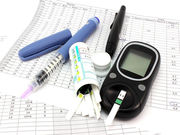Youth with DEBs had poor glycemic control at baseline that persisted through study
WEDNESDAY, Jan. 31, 2018 (HealthDay News) — For youth with type 1 diabetes, disordered eating behaviors (DEBs) are associated with higher hemoglobin A1c but not with measures of glycemic variability, according to a study published online Jan. 25 in Diabetes Care.
Miriam H. Eisenberg Colman, Ph.D., from the Eunice Kennedy Shriver National Institute of Child Health and Human Development in Bethesda, Md., and colleagues reported DEB and diabetes management at baseline and at six, 12, and 18 months for youth (ages 8 to 16) with type 1 diabetes participating in an 18-month behavioral intervention.
The researchers found that the intervention had no effect on DEB (P = 0.84). There were correlations for DEB with higher hemoglobin A1c (P = 0.001), mean sensor glucose (P = 0.001), and percent sensor glucose values >180 mg/dL (P = <0.001), and with lower 1,5-anhydroglucitol (P = 0.01) and worse diabetes adherence (P = 0.03). There was no correlation for DEB with percent sensor glucose values <70 mg/dL or any measures of glycemic variability. A significant DEB × time interaction effect was seen for mean sensor glucose (P = 0.05) and percent sensor glucose values >180 mg/dL (P = 0.04). Throughout the study there was a developmentally expected deterioration in glycemic control for participants reporting less DEB. For participants with more DEB, poor glycemic control was seen at baseline and this persisted through the study.
“Findings show a potential to improve diet quality without increasing DEB and indicate an association of DEB with persistent hyperglycemia but not hypoglycemia or glycemic variability,” the authors write.
Abstract/Full Text (subscription or payment may be required)
Copyright © 2018 HealthDay. All rights reserved.








